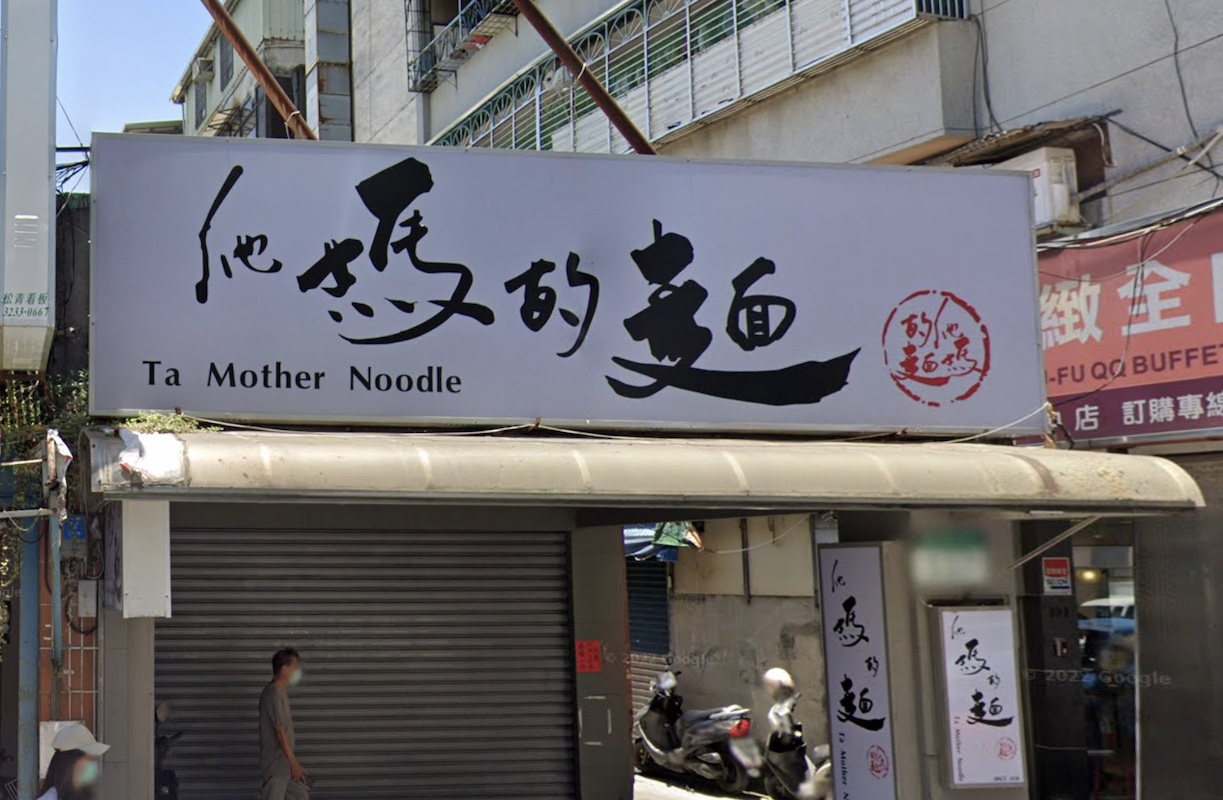Ta Mother Noodle
« previous post | next post »
Sign on a noodle shop in Xindan, Taiwan:

(Via Google Street View)
Mark Swofford has written a nice post about this on Pinyin News: "Mother-effing noodles".
The Chinese says (literally):
tā mā de miàn
他媽的麵
"his mother's noodles"
As anyone who has studied more than a few months of Chinese or is a regular Language Log reader knows, "his mother's" (tāmā de) is China's "national swear" (see the "Selected readings" below for some references). What makes this particular occurrence so interesting is the substitution of romanized "Ta" for "his" in the English, not to mention the grammatically mangled "Mother Noodle".
Never mind the questionable language or the unpretentiousness of the shop, the calligraphy is stunning, and I'd bet that their noodles would knock your socks off — if they were still open.
Selected readings
- "The sound of swearing" (12/7/22)
- "Carrie Lam's mother" (1/30/22)
- "TMD and LPM: a tale of five 'mothers'" (6/25/22)
- "Blindly busy" (8/26/18)
- "Deplorable words" (Language Hat, 8/2/04)
- "Tamade" (Language Hat, 7/23/05)
- "The degendering of the third person pronoun in Mandarin, pt. 2" (10/16/17)
- "The degendering of the third person pronoun in Mandarin " (12/12/13)
- "Roman-letter Mandarin pronoun of indeterminate gender " (9/9/16)
John Swindle said,
August 10, 2023 @ 8:29 pm
Joy Cup Noodles Mean ( 麵 ) in Honolulu is really good and sometimes has Country & Western music on the Amazon Echo. The name of the restaurant is however hard to remember because the sequence of words is unusual.
Ben Zimmer said,
August 10, 2023 @ 9:17 pm
@John Swindle: Seems too clever by half? From Honolulu Magazine:
profan said,
August 11, 2023 @ 5:51 am
Don't know anything about Chinese, but in Russian "his mother" (in inverted word order: мать его = mother of his) also works as a swear. This restaurant's name in Russian could work as "Лапша, мать его". It wouldn't work with the possessive/genitive (*His mother's noodle / *лапша его матери"
Chris Button said,
August 11, 2023 @ 6:09 am
The alliteration and rhythm is nice too. T..m..d..m.. with open syllables until the last word.
Chris Button said,
August 11, 2023 @ 6:51 am
I suppose intonation will make the "ā" in "tā mā" surface differently in the two words despite the romanization. That would make the tā rhythmically more like the "de" that follows than the "mā".
Cervantes said,
August 11, 2023 @ 7:05 am
I don't know how this became a "swear" in Chinese, but it is in English and Spanish as well. In English "mother" as a vulgar insult is short for "motherfucker," presumably. In Spanish, "tu madre" omits "chinga" or whatever else you care to imagine. In For Whom the Bell Tolls, Hemingway has his guerillas shorten "Me cago en el leche de to madre" to just "leche." This seems to be a common process.
Cervantes said,
August 11, 2023 @ 7:15 am
That's "tu" madre of course, not "to." Typo.
Peter Grubtal said,
August 11, 2023 @ 11:49 am
Cervantes
I don't know where you get your coarse language from, but certainly in south England expressions including "mother" were not native in my time.
"motherfucker" might have been known from American films, but I don't think it ever became a usual expression in England.
Cervantes said,
August 11, 2023 @ 12:31 pm
The Brits are noted for being polite.